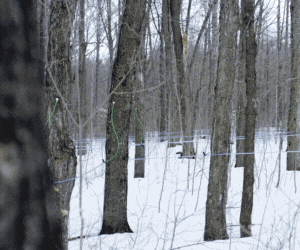UVM Proctor Page
UVM names new director of Proctor Maple Research Center
Dr. Tim Rademacher will take over the center this fall
By PETER GREGG | JULY 17, 2024
UNDERHILL CENTER, Vt.—Dr. Tim Rademacher has been named the new director of University of Vermont’s Proctor Maple Research Center, taking over from longtime director Dr. Timothy Perkins, who retired last year.
Rademacher will assume duties at Proctor this fall, overseeing research projects and managing permanent staffers and student researchers. Proctor is the 300-acre field research station of the Department of Plant Biology at the University of Vermont.
Born in Germany, Rademacher’s did both his undergraduate and doctoral work at Cambridge University in England and post-doctoral work at Harvard University in the university's research forest in Petersham, Massachusetts.
For the last year and half he has been permanent researcher in forest ecophysiology and sustainable development at Centre ACER. He also was an associate professor at the University of Quebec in Outaouais.
Rademacher said he has many ideas about how he might incorporate technology in service of both maple education and for the industry.
“There are loads of interesting data that can be shared, such as real-time streaming of our sub-flow during the sugaring season. I know that this data already exists, but maybe just repackaging it to make it more accessible and more interactive for people could actually help producers who are making decisions on how they manage their forests, when to tap, or when to switch on the vacuum pumps, these kind of things.”
Rademacher says he will focus on many of the impactful issues facing modern sugarmakers.
“Climate Change, invasive species, biodiversity loss, these kind of factors become more and more important, and yet they also need to be reconciled with the economic reality of maple sugaring," he said.
"Depending on the region, let's just pick a date and say, they used to tap in March, and now they do it in February, and they see these changes," he said. "So they are really interested in the causes, but you need a different research context because those causes are not applied questions. It's Proctor that is going to play a very important role in these larger, bigger-picture questions."
"Most importantly, how we can protect this industry? My goal is for PMRC to answer some of the important scientific questions, so that we can make sure that this industry continues to thrive," he said.
Rademacher says he will continue with Proctor's long history of sharing research information with the industry at large.
“I'm very excited to move back down south of the border and join Proctor with its rich history and its excellent work that has really pushed the industry in the past. I hope to build on that and to continue the wonderful work that has been done by Timothy Perkins, Abby van den Berg, Mark Isselhardt, Timothy Wilmot, and all the people that are there, and that were there recently, and that have really been doing great work already. Rademacher said his most recent experience in Canada helped gain a full industry perspective.
“The other thing is that maple forests don't care about political borders. If you do research just in Quebec on how maple groves will react to warming temperatures, you can't really say much about it because you're missing a large part of the distribution," he said.
"Same if you do research just in the U.S. So, one of my hopes is that because of the networks I’ve built, we can actually do cross-border science, because to get holistic answers on how maple groves will react in the future, we need to understand the whole distribution, how the northern border reacts, how the southern margin reacts, and that goes from Kentucky to Quebec."

































